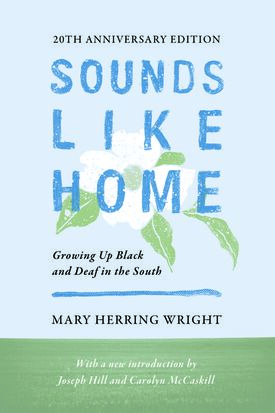
Sounds Like Home
Growing Up Black and Deaf in the South
20th Anniversary Edition
“I decided to write my story because I wanted my children to have a lasting document that chronicled my experiences growing up as a deaf person in Iron Mine, North Carolina. I also decided to write my story for my many deaf friends because my story, in many ways, is also their story.”—From Mary Herring Wright’s Foreword to "Sounds Like Home"
Carolyn McCaskill's Interview with the Author for the Black ASL Project
Description
Originally published in 1999, Sounds Like Home adds an important dimension to the canon of deaf literature by presenting the perspective of an African American deaf woman who attended a segregated deaf school. Mary Herring Wright documents her life from the mid-1920s to the early 1940s, offering a rich account of her home life in rural North Carolina and her education at the North Carolina School for the Deaf and Blind, which had a separate campus for African American students. This 20th anniversary edition of Wright’s story includes a new introduction by scholars Joseph Hill and Carolyn McCaskill, who note that the historical documents and photographs of segregated Black deaf schools have mostly been lost. Sounds Like Home serves “as a permanent witness to the lives of Black Deaf people.”
Mary Herring Wright (1923–2018) grew up in Iron Mine, North Carolina. She began losing her hearing at the age of eight, and was completely deaf by age ten. In 1935, her family sent her to the North Carolina School for the Deaf and Blind, where she was both a student and a teacher. She then moved to Washington, DC and became a clerk for the US Department of the Navy. She later returned to her roots in North Carolina and raised a family. Mary Herring Wright was awarded an honorary degree from Gallaudet University in 2004. She is also the author of Far From Home: Memories of World War II and Afterward.
Mary Herring Wright participated as an informant in the Black ASL Project, which researched the linguistic features that make Black ASL recognizable as a distinct variety of American Sign Language. The research was published in the book The Hidden Treasure of Black ASL: Its History and Structure, and her interviews can be seen at the Gallaudet University Press YouTube channel.
Reviews
Praise for the first edition
— Disability Studies Quarterly
“Precious few works have examined the intersection between race and disability…Sounds Like Home is a welcomed illustration of the quiet resolve and considerable accomplishments of working women of all colors and communities. Their efforts grace our lives forever; their stories only infrequently enrich our books.”
"Wright’s first-hand account opens the door for discussions about the intersectionality of language, culture, and identity. It contributes to growing awareness regarding current gaps in identifying and implementing culturally responsive educational practices that deaf education and deaf studies are now seeking to fill. It also emphasizes the need for diversity among teachers who teach deaf children. Nugget: The intended audience is professionals, educators, and others who are interested in the intersectionality of being Black and deaf. Readers are likely to find commonalities in the roles that race, culture, and geography play in the lives of deaf children in the 1940s and currently in 2022."
— Chidinma Amadi-Ihebuzor, Journal of Deaf Studies and Deaf Education